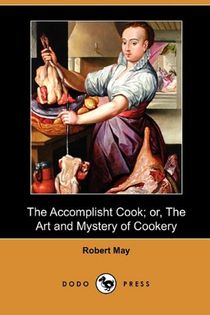
The Accomplisht Cook
by Robert May

says
The “Bill of Fare,” a showy 39-course feast, which includes elaborate roasts, custards, and jellies, takes center stage in this 1660 English cookery book. Authored by a royalist cook, the ancient collection also includes shout-outs to two European staples that eventually made a splash stateside: the potato and the turkey.
from the publisher
The Accomplisht Cook is an English cookery book published by the professional cook Robert May in 1660, and the first to group recipes logically into 24 sections. It was much the largest cookery book in England up to that time, providing numerous recipes for boiling, roasting, and frying meat, and others for salads, puddings, sauces, and baking. Eight of the sections are devoted to fish, with separate sections for carp, pike, salmon, sturgeon, and shellfish. Another section covers only eggs; and the next only artichokes.
The book was one of the few cookery books published during the Commonwealth of Oliver Cromwell, and free of the plagiarism common at its time. It made early use of two ingredients brought to Europe from the Americas, the potato and the turkey. [Wikipedia]
Most popular
- Original Publisher
- Dodo Press
- Date of publication
- 1660
- ISBN
- 1503306410
Recommended by
Frances Bissell
Food writer
The seventeenth century was one of the richest, most vibrant and exciting periods in English culinary history with fascinating cookbooks. First published in 1660, this is the work of a chef who cooked in the aristocratic houses of England, having been trained by his father, also a chef, in the kitchens of seventeenth century Parisian nobility. Dishes in the “French fashion” abound, as do recipes inspired by sources as diverse as Turkey, Poland, Portugal and Italy. In true chef’s style he also has a penchant for random phonetic spelling, which I find very endearing. Thus on one page we have, for halibut, both “hollyburt” and “holyburt”. Most of all, I like his recipe for “wivos mequidos”, none other than a dish of “huevos” or eggs “in the Spanish fashion”. Apart from the extreme deliciousness and ‘cookability’ of many of his recipes - lemon cream flavoured with orange flower water, little Portuguese sponge cakes flavoured with rosewater, a lobster pie, a very fine rice pudding, a crayfish pottage, some interesting ways with veal including small veal or chicken pies and delicious oyster pies and oyster jellies which have become part of my own culinary repertoire - I find the book enormously comforting in that it demonstrates what I have long held to be true. There has not been a revolution in the British kitchen, merely an evolution. We have been here before.
Bee Wilson
Food writer and historian
This is the book to turn to if you want to be reminded that cooking is not all a story of progress. In 1685, May understood more about flavours than many cooks today. Highlights include 21 ways of making omelettes, including one with asparagus and verjuice.
Glyn Hughes
Food historian
Subtitled: "The art & mystery of cookery. Wherein the whole art is revealed in a more easie and perfect method, than hath been publisht in any language."
Peter Ross
Culinary librarian
The most complete record of England's finest period of creative and innovative cooking (Elizabethan and Jacobean) - it is also usable by the modern cook
Tom Jaine
Food writer
Just the most important 17th century cookery book and a pioneer in so many ways.
Peter Brears
Food historian
Ken Albala
Food historian







